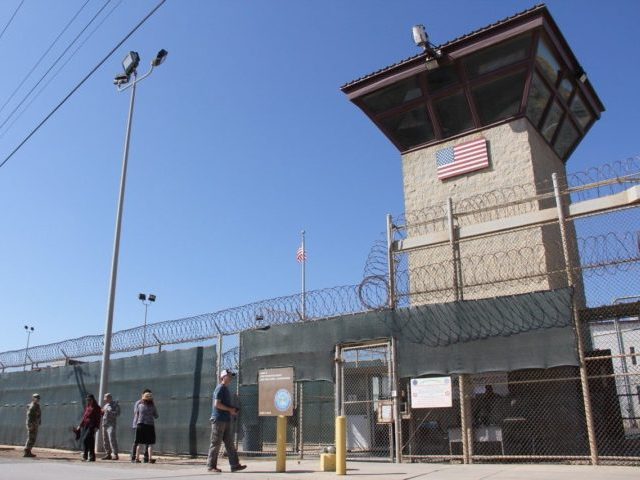The military commission charged with trying prisoners held at the Guantánamo Bay detention center continues to delay the trials of the admitted mastermind of the September 11, 2001, attacks on the American homeland and four of his co-conspirators, 16 years after the jihadists executed the deadliest terrorist attack on U.S. soil.
In July, the commission was expected to hold hearings on cases dealing with 9/11 and the 2000 attack on the U.S.S. Cole near Yemen.
However, the New Yorker reports that Military Judges James L. Pohl and Vance Spat “put them on hold because, for one reason or the other, the Navy didn’t want to provide a fast boat to take the judges and their staffs from the airstrip to the courthouse, saying that they should just get a ride with victims’ families and the prosecution and defense lawyers.”
“The judges objected, saying that this threatened their independence and violated their rules against ‘co-mingling.’ The resolution involved the transfer of three hundred dollars from the Pentagon to the Navy; it took about a month to work out that deal,” it added.
Of the 41 prisoners still held at Gitmo, the majority (14) are from war-ravaged Yemen, according to the Miami Herald.
Saudi Arabia produced the second largest number (7) of detainees still held at the Guantánamo facility.
The remaining half are from Pakistan (4), Afghanistan (2), Algeria (2), Libya (2), Malaysia (2), Indonesia (1), Iraq (1), Kenya (1), Somalia (1), Morocco (1), Palestine (1), Tunisia (1), and United Arab Emirates (1).
Although former U.S. President Barack Obama failed to keep his campaign promise to shut down the detention center, commonly known as Gitmo, he reduced the prison population from the 242 held at the facility at the time of his inauguration to 41 by the time he left office.
It appears that U.S. President Donald Trump plans to make good on his pledge to send newly captured terrorists to Gitmo, which is currently operating at an estimated cost to American taxpayers of $10 million per prisoner (an estimated $440 million each year), according to some assessments.
The Trump administration recently announced that it would eliminate the Guantánamo closure envoy position created by Obama’s State Department and invest nearly a half a billion dollars on new construction.
Citing the slow-moving pace of the military commissions, which have only produced eight convictions (including four overturned), and the cost of operating the facility, critics continue to argue in favor of allowing civilian courts on U.S. soil to handle the remaining cases.
Nevertheless, U.S. law approved under the Obama administration makes it impossible to transfer any Guantánamo prisoner to the United States.
The vast majority (26) of prisoners held at Gitmo have been deemed “forever prisoners,” or too dangerous to release, a designation that was affirmed by the Obama administration after releasing other captives who had been named indefinite detainees by his predecessor.
Of the remaining prisoners, a parole-style panel assembled by Obama, known as the Periodic Review Board (PRB), has cleared five for release.
However, it remains unclear whether they will be transferred to a different country or released by the new administration.
Khalid Sheikh Mohammed (KSM), the admitted master planner of the 9/11 attacks, and four of his co-conspirators are among the only seven prisoners still held at Gitmo who face charges before a “military commission.”
One of those trials—involving Abd al Rahim al Nashiri, who has been accused of the 2000 attack on the USS Cole—has yet to begin.
Of the four overturned convictions out of a total of eight, the military commission will have to deal with three.
The other prisoner has appealed his life sentence to the U.S. Supreme Court.
In total, ten “of the captives have cases being handled through commission proceedings—two through plea bargains and one who is convicted of war crimes, serving a life sentence, and has appealed to the U.S. Supreme Court,” explains the Miami Herald.
“The military commissions are neither traditional courts martial nor civilian courts but a system slapped together after 9/11, partly in reaction to Supreme Court rulings in favor of Guantánamo prisoners being denied basic rights,” argues the New Yorker.

COMMENTS
Please let us know if you're having issues with commenting.